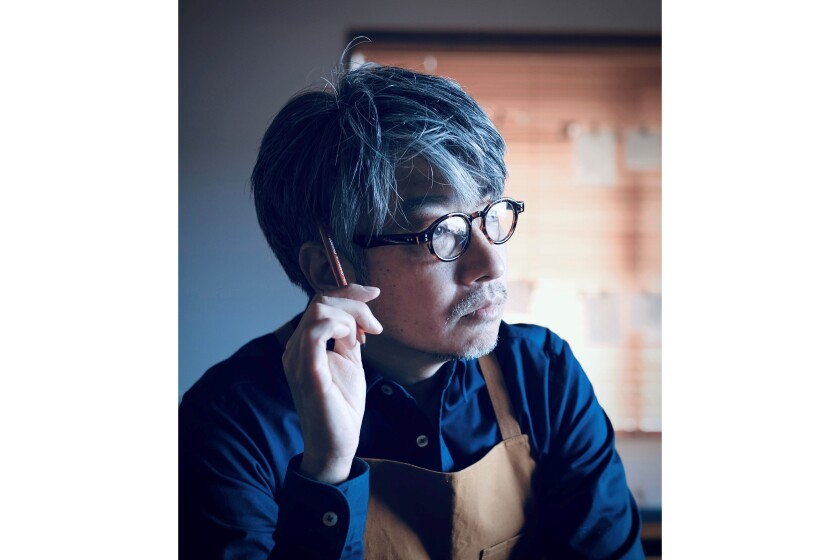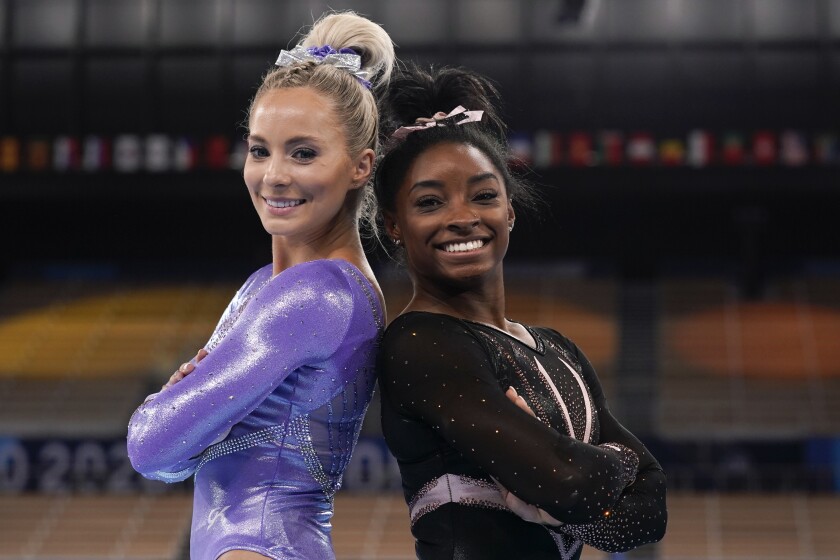Column: Pandemic Games are turning into Tokyo’s Olympic Scandal Games

At this point, the Tokyo organizing committee is the bureaucratic equivalent of the Titanic’s orchestra, its members figuratively continuing to play their instruments even as the hopelessness of their situation has come into focus.
They look exhausted.
They sound defeated.
“As the person in charge of the organizing committee that caused numerous scandals,” president Seiko Hashimoto said in Japanese, “I feel painfully responsible.”
And the opening ceremony hasn’t even taken place yet.
The Pandemic Games have barely started, but they are already a full-scale public-relations disaster.
A Tokyo Games mired in controversy could cast the Olympic movement into a void that could have consequences that reach all the way to Los Angeles.
One of the anticipated stars of these Olympics, 20-year-old Takefusa Kubo, scored a magnificent goal to lead the host country’s men’s soccer team to a 1-0 victory over South Africa on Thursday night, but the heroics of the so-called “Japanese Messi” were entirely overshadowed by the latest controversy to rock the Games.
The director of the opening ceremony was fired in the wake of the circulation of a video in which he made a Holocaust joke while performing a comedy routine. Kentaro Kobayashi had replaced Hiroshi Sasaki, who suggested plus-size comedian Naomi Watanabe could appear in the ceremony as the “Olympig.”
Earlier in the week, musician Keigo Oyamada stepped down as the composer for the opening and closing ceremonies after the rediscovery of an old interview in which he said he bullied disabled classmates when he was in school.
Forget about showcasing Japanese ingenuity to the world. The local population can’t even be convinced of the value of these Games, as the widespread feeling is that public safety is being further compromised by the financial concerns of a self-interested government that has botched its pandemic response at virtually every stage. Nearly 2,000 new cases of COVID-19 were reported in Tokyo on Thursday, the highest single-day total since mid-January.

“I recognize there are a lot of people who feel like they don’t want to watch the opening ceremony,” Hashimoto said.
An advertising campaign by Galaxy Mobile Japan on Twitter backfired spectacularly, with the #TweetToCheer hashtag eliciting another round of widespread calls for the Games to be canceled.
The public’s disenchantment has temporarily transformed a Japanese press corps that is generally supportive of its institutions.
Ordinarily, the people of Japan love sporting events that play to their patriotism, particularly the Olympics. In the months leading up to the typical Games, there would be fawning headline after fawning headline about athletes such as Kubo and Rikako Ikee, who recovered from leukemia to earn a spot on the women’s swim team.
Both USC and UCLA are richly represented at the Tokyo Olympics, with a combined 103 athletes representing the universities with 32 national teams.
The Japanese media would have played up the theme of the Olympics being a symbol of the country’s recovery from the tsunami and earthquake that struck the Tohoku region in 2011, ignoring the complaints by victims over how they were let down by the government.
Instead, there’s been a relentless wave of negativity, which extends far beyond the typical arguments about costs that are debated at every Olympics.
The appalling remarks made by Kobayashi, the opening ceremony director, and Oyamada, the composer, were made in the 1990s. Somebody had to look for them. It’s fair to wonder whether the comments would have ever resurfaced if the Games were staged under normal circumstances.
Before Kobayashi’s 15 minutes of infamy, the media was fixated on International Olympic Committee president Thomas Bach, who made a poorly received visit to Hiroshima and was welcomed with other officials at a controversial reception that was attended by 40 or so people.
There were also major stories about an alleged sexual assault by an Olympic volunteer from Uzbekistan that occurred at the National Stadium; the ultimately successful manhunt for the Ugandan weightlifter who escaped from his pre-Olympic training camp to start a new life in Japan; and the South Korean starting a food service for its athletes out of concerns the Olympic village was serving meals that could contain ingredients from Fukushima, which was the site of a nuclear disaster a decade ago.
Kubo? Ikee? Whatever.
A news conference on Thursday at the Main Press Center reflected the general tone of the coverage.
This is their moment: Shohei Ohtani, Naomi Osaka, Hideki Matsuyama, Naoya Inoue and more Japanese athletes shine in unique ways on the global stage.
When Hashimoto and organizing committee chief operating officer Toshihiro Muto were asked whether they were considering resigning, Hashimoto said she intended to continue because she didn’t want to cause any further disruptions.
She avoided directly answering a question about whether she regretted the decision to stage the Games.
At one point, Hashimoto was asked about women’s soccer game that was played the previous day in the northern part of Japan’s mainland. The match was one of a handful of events at these Olympics in which fans could attend.
The game’s official attendance figure wasn’t announced, leading a reporter to remind Hashimoto of how she had previously spoken of the importance of making the locals feel safe. The reporter asked why the numbers weren’t immediately released and went on to say that he didn’t think she could gain the trust of the public without more transparency.
Spokesman Masa Takaya explained there were problems with the information-gathering process and revealed there were approximately 2,000 people at the match, after which Hashimoto agreed with the journalist’s assertion.
The reporter followed up with another cutting question.
“Regardless of what’s happening with the coronavirus, the attendance figures of sporting events are the kinds of things that are usually announced during games, if not shortly after,” he said. “I think it’s extremely basic. The fact that you can’t even do something like that, what does it say?”
Takaya replied: “We have to accept your point.”
He sounded as if he knew there was no upside in pushing back, as if he accepted that he couldn’t change any minds that day, maybe ever.
Go beyond the scoreboard
Get the latest on L.A.'s teams in the daily Sports Report newsletter.
You may occasionally receive promotional content from the Los Angeles Times.








